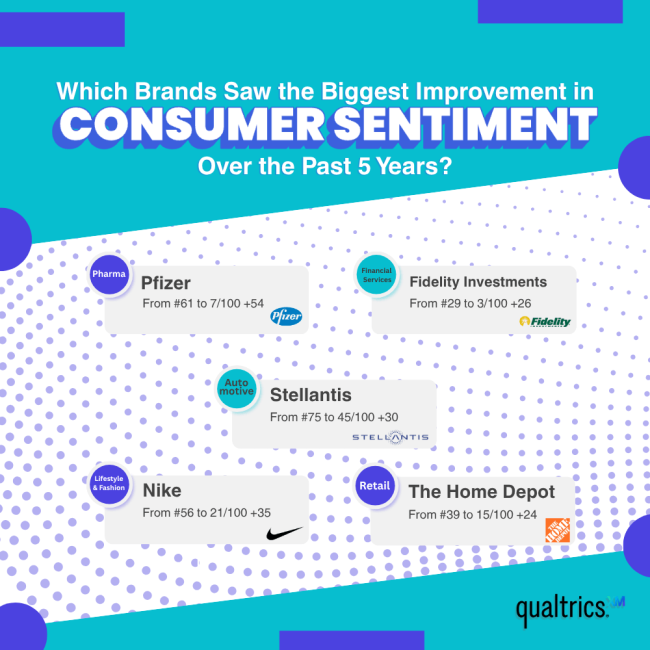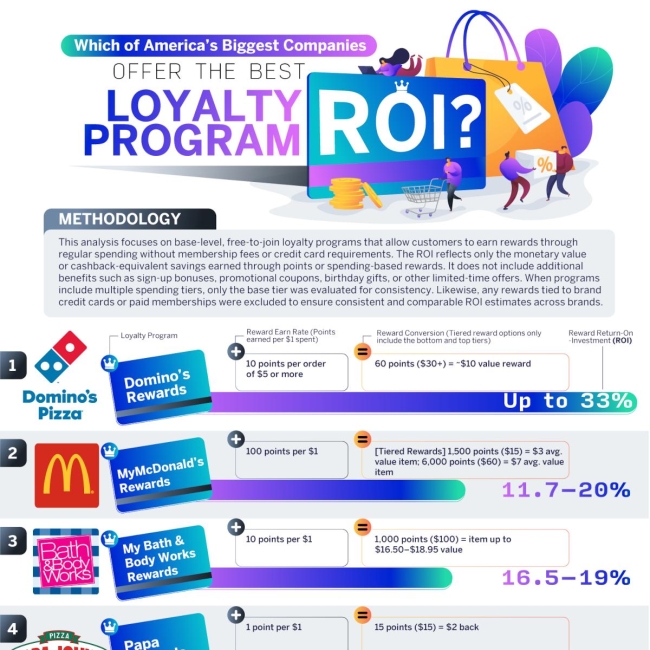Each year, hundreds of well-known companies rise or fall in public perception, but some manage to make a leap that turns heads. These gains in how customers feel about a company can be due to a bold business shift, a cultural moment, or smart positioning in a tough economy.
By examining polling data from the past five years, we can learn a lot about what moves the needle when it comes to customer satisfaction. That’s why the team at Qualtrics decided to take a deep dive into the top 100 brands with the best reputations in America, exploring which of the nation’s most visible brands made the most dramatic improvements from one year to the next and what might account for these increases.

How We Identified the Biggest Gainers in Brand Reputation
To pinpoint the brands that made the most significant leaps in public perception for this consumer sentiment report, we analyzed annual rankings from Axios and Harris Poll. This data measures companies’ reputation quotient (RQ) scores, capturing consumer sentiment about the most visible brands in the U.S. across a variety of dimensions, such as affinity, ethics, growth, products/service, citizenship, vision, and culture. The results form a top 100 rankings list, which we examined to identify the brands that improved their rank the most from one year to the next.
While their paths to improvement were all different, each of these brands experienced a clear shift in how it was viewed by the public. Below, we break down the biggest year-over-year gains in brand reputation from 2021 through 2025 and explore the possible moments, moves, or messaging that may have fueled those changes.
2021: A Year of Vaccines and New Routines
In a year shaped by the COVID-19 pandemic, some of the most-loved brands were companies that brought both reassurance and possibility. Pfizer saw the most dramatic rise in brand reputation, climbing 54 positions to reach #7 on the list, while fellow vaccine-maker Moderna held the #3 spot. Outdoor and travel-friendly brands like Patagonia (which climbed 31 positions to reach #1 overall) and Honda (which gained 14) resonated with people eager to escape lockdown life, while Unilever climbed 20 spots on the strength of its trusted personal care and hygiene products.
Meanwhile, companies in the industrial and logistics sectors, hit hard by pandemic supply chain issues, faltered in the brand image rankings. For instance, the best-performing logistics company, UPS, fell nine positions on the list, while rival FedEx dropped 13 spots. Grocery stores also had a rough year in 2021, with the best performance coming from Wegmans; while its rank fell seven spots, that was less of a loss than Publix (down 19 positions) and Kroger (down 21 spots).
Pfizer at the Forefront of COVID Recovery
Pfizer’s 54-position jump in the rankings was likely driven by a surge in public trust and admiration. In 2021, it became the first American pharmaceutical company to receive full FDA authorization for its COVID-19 vaccine, a milestone that helped reopen the U.S. economy and reposition Pfizer as a modern, forward-looking brand. It subsequently delivered tens of millions of doses of the COVID-19 vaccine in the U.S., turning the company into a household name.
The company's strong marks across all seven RQ dimensions reflected a shift in consumer perception: Pfizer was no longer just a pharmaceutical giant but a symbol of recovery. Consumers saw Pfizer as an innovative leader, boosting the brand’s vision and growth scores, and CEO Albert Bourla helped to improve the brand’s ethics and citizenship scores with calm communication to dispel consumer skepticism about the quickly produced and released COVID-19 vaccines. It worked, and the company posted $81 billion in revenue in 2021, nearly double that of the previous year.
2022: Innovation and the Pull of Familiarity
In 2022, shoppers expressed strong interest in supporting local, social, and environmental causes — but not enough to skip the convenience of Amazon, which sat comfortably at #8 on the list of the top 100 brands. Consumers gravitated toward familiar brands with a dependable track record, especially those that offered tangible value while still signaling ethical intent and innovation. Despite growing concerns about inflation, supply chain disruptions, and a potentially contracting economy, the brands that stood out were the ones that delivered both emotionally and functionally.
Trusted grocery chains like Trader Joe’s (#1), H-E-B (#2), and Wegmans (#5) earned high marks for their consistency, local presence, and ability to meet basic needs when supply chains came up short, as did Home Depot, which climbed 27 spots. But this year also marked a notable surge in consumer sentiment for tech companies like Samsung (+25), Sony (+24), IBM (+28), and Microsoft (+21), all of which continued to innovate while maintaining reliability. Their efforts to keep people digitally connected, whether through product ecosystems, workplace tools, or entertainment, aligned well with a consumer base still transitioning out of the pandemic. However, the newly formed Stellantis would prove to be the biggest gainer, jumping 30 positions in the brand image rankings.
Stellantis Builds Trust in a Turbulent Year
Formed in 2021 through the merger of Fiat Chrysler Automobiles and PSA Groupe, Stellantis brought together a powerhouse lineup of familiar sub-brands, including Jeep, Dodge, and Ram. By 2022, the company had done more than just merge — it had begun to define itself as a forward-looking, adaptable force in the auto industry.
Consumers responded positively to its bold push into electric vehicle development, sustainability goals, and public investments in software innovation. These efforts strengthened perceptions of Stellantis’s long-term vision and growth potential while also reinforcing trust in its commitment to environmental responsibility.
But Stellantis didn’t just talk about the future — it delivered in the present. As rivals struggled with supply chain setbacks, Stellantis managed to keep vehicles moving and dealer lots stocked. That reliability during a time of uncertainty boosted consumer sentiment around both reliability and adaptability. And with a low-drama, high-clarity approach to public messaging, the brand positioned itself as stable, practical, and quietly ambitious, a combination that strongly resonated with consumers in 2022.
2023: Brands Build Loyalty Through Reliability
In 2023, consumers rewarded brands that blended authenticity, reliability, and a clear sense of purpose. Amid ongoing inflation, market volatility, and geopolitical uncertainty, shoppers doubled down on companies that consistently delivered, especially those aligned with everyday needs and personal values.
Brands that felt both familiar and trustworthy rose sharply in public sentiment. Nike led the year’s gains, jumping 35 positions on the top 100 list, while American Express climbed 29 spots and Costco gained 24, ranking #2 overall. These companies succeeded in increasing their brand reputation not just by meeting functional needs but by reinforcing loyalty through consistency, transparency, and cultural awareness.
As the pandemic further receded, consumer behavior reflected a shift toward grounded priorities: quality products, strong customer service, and value-driven engagement. Whether they were stocking up at Costco, relying on Amex’s customer-first policies, or watching Nike navigate cultural conversations with confidence, consumers gravitated to reputable brands that stood for something and backed it up with real performance.
Nike Rebounds With Purpose and Performance
Nike saw the biggest year-over-year jump in consumer sentiment, driven by its continued ability to blend cultural relevance with product innovation. While facing reputational risks — including gender discrimination allegations — the brand leaned on its long-standing ability to exceed customer expectations, strategic marketing campaigns, and high-profile endorsements to reinforce its position as a leading athletic footwear and apparel brand.
Consumers responded to Nike’s clear presence in cultural conversations and its constant evolution in performance technology and product design. By listening to the needs and values of its audience, Nike earned renewed loyalty and cemented its position not just as a sportswear leader but as a brand that reflects and adapts to the moment.
2024: Innovation Leads, but Trust Still Matters
Artificial intelligence took center stage in 2024, with Nvidia’s debut at #1 marking a shift in how consumers and investors viewed technology. AI wasn’t just hype — it was becoming part of daily life, and companies seen as shaping its future gained serious traction in public perception. But innovation alone didn’t define the year. Consumers also prioritized dependability, clarity, and a sense of emotional connection with the brands they turned to most.
Some of the biggest reputation gains came from brands that offered consumers a sense of trust and security during uncertain economic times. Hobby Lobby (+25) resonated with shoppers who continued to support the brand’s faith-centered identity, while Coca-Cola (+22) gained ground as a symbol of consistency during unpredictable times. Meanwhile, Dell (+22) benefited from a renewed appreciation for accessible, no-nonsense tech, offering reliable devices and customer service at a time when hybrid work and affordability remained top of mind. And Fidelity
Investments, which jumped 26 spots on the brand reputation list, earned its highest-ever ranking thanks to its consistent focus on ethical practices, transparency, and customer-first financial services. Together, these brands showed that in a fast-changing world, the most trusted brands were those that balanced relevance with reassurance.
Fidelity Investments Gains Ground Through Steady Leadership
In a year marked by inflation and economic anxiety, Fidelity stood out by doing exactly what consumers wanted most: staying calm, clear, and consistent. While much of the financial sector wrestled with shifting expectations, Fidelity’s commitment to ethical practices, transparency, and long-term thinking helped earn a 26-position jump in consumer sentiment.
The company leaned into its reputation, offering stable financial guidance as well as well-received investment funds focused on companies that meet high standards for environmental protection, social responsibility, and ethical governance. At a time when trust in institutions was fragile, Fidelity didn’t just weather the uncertainty; it gained ground by making trust a core part of its brand identity.
2025: Affordability and Accountability
As 2025 moves into its second half, consumer sentiment is being shaped by two major forces: economic pressure and brand credibility. Consumers are noticing that brands have had to make tough choices this year, with some upping their prices in response to inflation and others delivering a lesser-quality product, both of which harm a brand’s reputation. With inflation still lingering and tariffs reshaping prices, Americans are looking more closely at how companies respond, and they’re rewarding the ones that prioritize transparency, consistency, and value.
Brands like Trader Joe’s (#1) and Arizona Beverage Company (#7) continue to lead the way thanks to clear pricing strategies and strong emotional ties with their customers. And Home Depot, the fastest climber on the list this year, gained 24 positions by keeping price increases in check and maintaining a focus on customer service. Meanwhile, Microsoft, recovering from a decline in trust following several notable security breaches, made a comeback in the rankings by doubling down on data privacy and user safety. That earned the tech giant a 15-spot climb, landing at #3.
Other brands made impressive moves by adapting to consumer expectations in very different ways. ExxonMobil, up 20 positions from last year, benefited from renewed attention on domestic energy production and a more public-facing commitment to emissions reduction, key topics as energy costs remained high. And Chipotle, which jumped 19 spots, continued to reinforce its identity as a fast-casual brand with integrity, building on consumer loyalty with menu innovation, digital convenience, and cleaner ingredient sourcing. Both brands gained traction by aligning their messaging with what mattered most to their audiences: clarity, accountability, and consistency.
Home Depot Stands Out by Holding the Line
In a year when pricing decisions have drawn more scrutiny than ever, Home Depot set itself apart by promising not to raise prices in response to new tariffs. That move signaled a level of consumer-first thinking that resonated with shoppers increasingly sensitive to inflation and corporate motives.
Home Depot’s steady reputation gains reflect more than just affordability. The company has stayed focused on its core business values, avoiding divisive political engagement and doubling down on customer service, product availability, and local community support. For consumers seeking stability, neutrality, and fair pricing, Home Depot projected the image of a brand that didn’t flinch under pressure. That approach helped it gain 24 positions and cemented its upward momentum in a year when consistency is everything.
Want to learn more about how you can track your brand’s performance and boost your company’s reputation? Qualtrics customer experience management software can help, giving you the data you need to optimize your performance and raise your net promoter score. Reach out today to get a demo and see what we can do to bolster your brand image.



